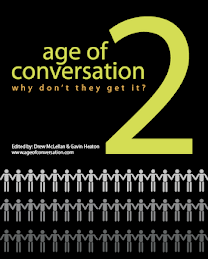There is a lot of talk today about the practice of Personal Branding and about how social media which we know as social networks like FaceBook or Linked-in, public forums like Twitter and other vehicles like blogs and podcasts really help us maximize the reach that each of us, as individuals, both professionally and personally, can have to establish a bigger and better network; be it to look for a new job, become part of a certain community, collaborate with other people, learn from them and share with them our point perspectives too, thus exercising what we call our Personal Brand.
In fact in this “Age of Conversation”, this is a subject that has become so important that we just cannot affor to ignore. So important in fact, that 86% of professional talent recruiters today look on-line for information on their candidates; plus 7 out of 10 of those recruiters have said that the odds of each candidate significantly improves if whatever information they find on-line is positive. (Source: Execunet.com 2008 Executive Job Market Intelligence Report).
So relevant is this subject that there are now plenty of really good specialists on Personal Branding who, like Dan Schawbel have generated an excellent series of lessons and advices on how to successfully exercise your Personal Brand.
However, I’m convinced that in order to really leverage all those great lessons and suggestions, there are a few steps we need to take before we actually start to exercise our brand.
1- Understand that no matter what our level of involvement on line is, each and everyone of us already is a brand. In the words of Tom Peters: “No matter how old we are or what position we have nor in what industry we work; we all have to understand the importance of a brand. We ourselves are the CEOs of our own company: Me, inc. To do business today, our most important job is to be the brand manager of the brand call ME”.
2- Understand that like so, most of the rules commercial brands abide to, apply to us too. So we must make sure that our brand is clear, unique and different from the others. And to do so, there is nothing better than honesty and authenticity, that is, ensuring that all our words, actions and behavior (on & off line) reflect our values, principles, strengths and priorities as human beings; and yes that includes not hiding our areas of opportunity.
3- Deeply knowing our own brand. How can we be authentic and unique if we don’t really know ourselves? Before we move forward we need to do a huge job of reflection and retrospective. An analysis of ourselves. We need to define and call out our values and principles, our passions and callings. We have to identify all that matters the most to us in life.
4- Understand our current context: Once we’ve done this introspective work, we should be able to know how we see ourselves; however that might not entirely be the way other people sees us, so we need to ask ourselves: With whom do I interact with these days? What kind of relationship do I have with them? And tougher questions like: What perception do they have of me? Do they think of me as an expert on any given subject? Do I really have credibility among them?
Now, please remember to be cautious when asking these and remember that not everybody will appreciate you the same way and that you cannot be everything to everybody; and don’t forget that just like any other brand you’ll have your detractors and your ambassadors, the important thing will be to know who is which so you can determine how to interact with them.
5- Define in what context you want your Personal Brand to live in. Meaning, defining with whom we want to interact and through what channels we’d like to do so, while determining from whom do we want to learn and to whom do we want to be related and in which media.
In fact this is precisely one of the greatest gifts of Social Media: The possibility of connecting and interacting with very diverse people from very different places and backgrounds; people like oneself or great thought leaders, entrepreneurs or celebrities, which does take that old saying that goes: “Tell me who you hang with and I’ll tell you who you are” to a whole other level. And like they say: “If you want to be very good at playing tennis, don’t always play with those you can beat every time, play with some like Rafael Nadal”.
Well, there you have them, 5 previous steps to take to successfully launch and exercise your Personal Brand. Now as for actually exercising it, well that is subject for a whole other post.





